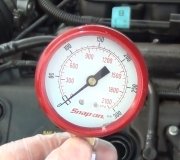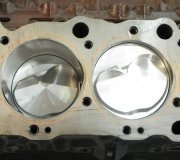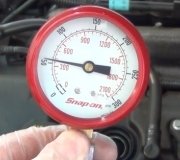Yup, adding oil is a common next step. If the reading goes up significantly, it's seaaling the rings, but that's only one out of four possibilities. The cylinder leakage test will instantly reveal what is causing the low compression.
Used to be common for all cylinders to develop low compression equally as the piston rings wore due to high mileage. Burned valves typically affected individual cylinders. Today it is a little more common to have worn piston rings in just one cylinder due to a leaking fuel injector causing excessive fuel to wash the lubricating oil off the cylinder wall. Chrysler, in general, has very little trouble with injectors, especially when compared to other manufacturers.
Still, low compression itself should not cause stalling. The Engine Computer controls idle speed by opening an air passage aound the throttle blade with the Automatic Idle Speed (AIS) motor, and increasing the length of time the injectors are held open. To show how much control the computer has, a Chrysler trainer demonstated unplugging an injector on a running V-8 engine on a Jeep. The computer overcame the misfire. One by one he unplugged six injectors. The engine still maintained proper idle speed with only two working cylinders. Obviously it ran extremely roughly, ... But it ran.
You appear to have only one or two affected cylinders, but they aren't totally dead, just not up to full power. You might be able to feel the misfire, but I suspect the stalling is not related.
If no problem shows up during the cylinder leakage test, suspect a worn lobe on the camshaft preventing an intake valve from opening. That can cause a low compression reading due to the inability of sufficient air to enter the cylinder. Worn lobes are caused by insufficient oiling, which is something else Chrysler has little trouble with.
Caradiodoc
Saturday, March 6th, 2010 AT 3:24 AM





